Flex your imagination
How games gave me the greatest gift I've ever received
I'm 13. It's Saturday morning, finally. I wake up before dawn, and tip-toe out of my bedroom and into the family room. I turn on the TV and immediately mute it. Then I turn on the Playstation. For the next couple of hours, I'm in complete bliss, immersed in a fantasy world.
Time flies by, and my parents eventually wake up and start making coffee. "Hey Grant, good morning," they say.
"I just got up," I quickly respond, almost defensively.
"Ok," they say.
We had a rule at my house that we could only play video games for 30 minutes a day on the weekends. So I would play for 30 more minutes, as if I had just begun. But I played closer to three hours on many Saturdays.
From my parent's perspective, video games were a complete waste of time. My dad grew up on a farm in a little town in southeast Texas. To this day, one of his favorite activities is to go fishing all day long out on the bay, even for 12 hours straight. If he doesn't get a single tug on his line during that whole time, he'll still say it was a good day.
He often took my brothers and I fishing, and needless to say, I thought that was a complete waste of time. Compared to my surreal adventures in video games, sitting on a boat was the last thing I wanted to do. All I could think about during those long days were the games that exhilarated my imagination. Even when I wasn't playing games, I was playing games.
On the fishing boat, I was just a little punk kid who couldn't even drive, who couldn't go anywhere without his parents supervision, and who sure as hell couldn't catch any fish. But in my mind, as I delved into one of my gaming memories, I was the savior of the entire human race.
You see, in my game, our colonies in distant parts of the galaxy were suddenly invaded by a confederation of alien species, each of whom was more ferocious, merciless, and hideous than the last. The alliance was motivated with religious fervor to accomplish one purpose: to discover ancient super-weapons, created by the ancestors of all living species. Humanity was losing the war, badly, and just when the aliens were encroaching upon our mother planet, I found what they were looking for.
Yes, me, 13 year-old Grant Shillings, discovered the artifact that had been hidden for millions of years. Of course, in the game world I had assumed the avatar of a genetically engineered super soldier with mythological powers, but it nevertheless felt like I did it myself. Once I found the weapon, I used it to turn the tides of the war, saving billions of lives, and I eliminated the biggest threat our galaxy has ever faced. At the climax of that adventure, I drove a jeep across the surface of a planet that was collapsing, all while listening to the tune of some of the most epic orchestral scores ever made, and I escaped just in the nick of time. It was, and still is, one of the coolest things I've ever done in my life.
My parents could never conceive the kinds of adventures I went on during those stolen hours in the mornings. To them, it seemed like I was being an absolute bum, just sitting in a chair and staring at the TV, jiggling my thumbs on a weird looking remote. But I wasn’t looking at the screen, I was looking through it.1
"Why don't you go outside and get some exercise?" they would prod, "Go play basketball or something." I liked basketball. I liked playing outside too. But I loved fighting aliens and driving jeeps and saving the world.
Little did I know it, but those experiences would eventually give me the greatest gift I’ve ever received.
“Real Life”
A few years later, I was finally old enough to leave the house on my own. In that phase of life, most teenagers are using their newfound freedom to stay out late and engage in illicit activities like smoking pot, drinking alcohol, having sex, driving fast, etc. I was staying up late too, but instead of all those things, I was playing video games. But this time, my three best friends were sitting on the couch next to me.
Sometimes our teenage world collided with the adult world, in striking ways. We would often play at Andy's house, and Andy's dad was a doctor, and he would start his days around 4am. On many nights we stayed up late enough to meet him as he was leaving, and it was always a bit ludicrous—he walking down the stairs in his white lab coat and slacks about to save lives for the next 12 hours, we sitting there in sweatpants and tshirts, having spent the last 12 hours saving lives, or at least so we pretended. He would smile and greet us warmly, but I always assumed he thought we were loafers, just using up his electricity, jaws aslack, laughing like a bunch of stoners til the wee hours.
But we weren't just sitting there, we were fighting for our lives. We were some of the last survivors of an apocalyptic outbreak of a deadly virus that mutated humans into all kinds of abominations—bloated zombies that spewed putrefying acid, carbuncled monstrosities using lizard-like tongues to pull us off ledges, witchlike apparitions that howled and attacked in frenzies with their catlike nails, and hulking behemoths that smashed cars around like they were soccer balls. We repulsed horde upon endless horde of these freaks, just barely dragging ourselves through hell and back. Sometimes, we would fall to the waves of these terrors, but every now and then, we would escape and survive, and the thrill of that is like nothing else I've ever experienced.
These memories from the game world are in many ways more real to me than events that happened in my "real life." Last week, I recounted in my own words the story of my favorite of these memories, a moment that has haunted me for the last 15 years of my life. It provokes a mysterious and mystical feeling in me, one that continues to simmer and stir my imagination like a bubbling cauldron. I'll never forget the first time I crashed in the middle of the ocean and explored The Tower that I found there.
Retelling that story last week was a powerful experience in flexing my imagination. I had to reach far back into my psyche, deep into the murky waters of memory, and recall the details of every wall, every rug, every window. But more importantly, I had to recall what it felt like, and then, to share all that on paper.
The Tower
New Year's Eve, 1960 I've been gazing at the sunset for hours, the heavenly golden glow of the clouds unnaturally extended as our plane pursues the sun westward. Below me I can see only water, behind me is only darkness. Though the view outside is exquisitely beautiful, inside me I feel a thick and oozing melancholy which pulls me ever downward. I know I…
After I published the essay, I spent some time with my nephews, who are six and nine years old, and they asked me to tell them about it. I stretched my mind again and recounted the story from memory (with some kid-friendly alterations). And they were totally captivated. When I concluded my tale, they begged me to tell the rest of it. I told them, "that's the end of chapter 1. Maybe I'll tell you the rest of the chapters soon." But they begged me to tell them NOW. And it went on like that the entire weekend. Every time we were together, they pleaded with me to tell them more about The Tower. And so I kept rehearsing the story as well as I could, and inventing things along the way to fill in the gaps.
It’s hard to keep the attention of children for long, especially these days, so when you find a story that’s that engrossing, you know you have something “real.” To be fair, the game makers deserve most of the credit for creating the game’s universe, but my story was only compelling because I was able to access and use my imagination. Perhaps that’s one of the most crucially overlooked benefits of games—they invigorate and strengthen the imagination unlike anything else.
It’s true that many media require you to activate your imagination for various reasons: to visualize what’s going on (books), to empathize with the characters (movies), or even to fill in the scenery (plays). But none of them allow you to have an active part in the determination of the world. Only games allow for that kind of interactivity, which forces you to wield your imagination. You are no longer an observer of the world, but an active agent. You get to determine what happens. But you have to envision it before you can do it.
And when you are able to do interact with a story in that way, the experiences are that much more immersive, and the memories are that much more powerful. They begin to influence the way you perceive the world, lending an aspect of mystery and grandiosity to everything you can lay your eyes on.
Every time I see a Renaissance-style church, I begin to think of Anor Londo from Dark Souls. Every time I travel in an underground subway system, I’m cast back to the tunnels from Metro 2033. Every time I commute to work and back, I see a tower that reminds me of Tenpenny Tower from Fallout 3. Every time I’m hiking in the mountains, I think about Bleak Falls Barrow from Skyrim. And so on.
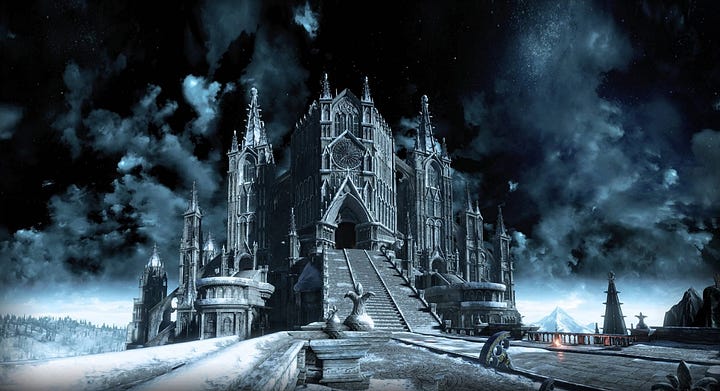

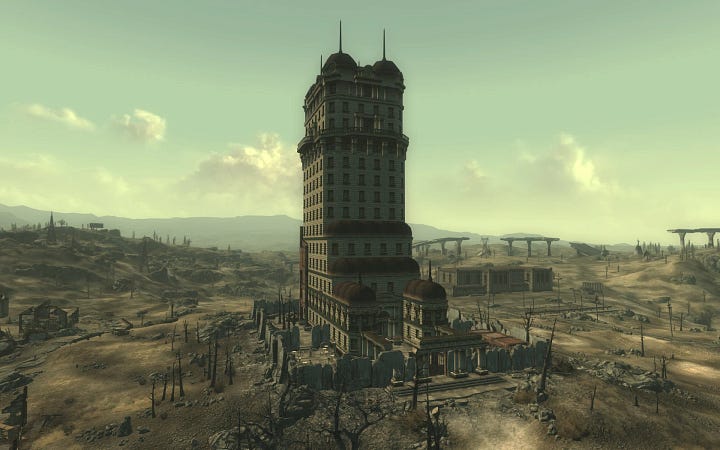
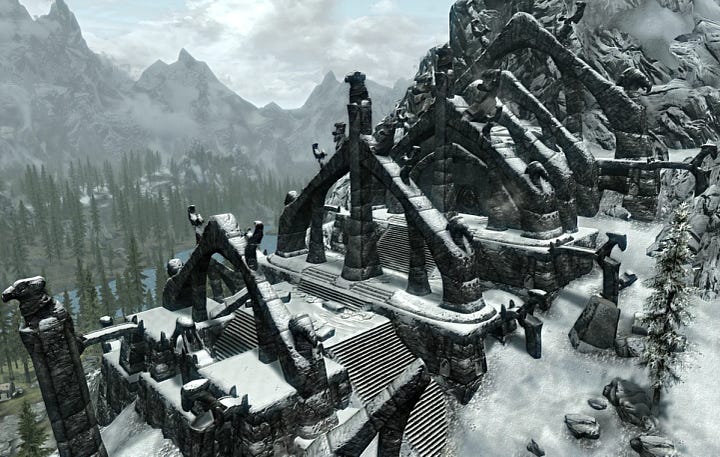
Lessons
Towards the end of high school, World of Warcraft (WoW) was released. It was more than just a game; it was a phenomenon. It swept up everyone I knew. WoW belonged to a nascent genre of games described as "massively multiplayer," which meant that in a given "world" there were tens of thousands of people playing simultaneously. You could go to a city and see hundreds of people hanging out in the town center, buying and selling goods, crafting rare items, recounting their exploits, chatting about their plans and dreams, telling jokes, even gambling. You could make friends in town and go on an adventure with them, only to be thwarted by another gang from the same city you had just left.
Between my two brothers and I, we only had one computer, and I cannot tell you how many times we fought with each other to play WoW. Sometimes we would follow the agreed-upon rotation (we each got an hour), and sometimes we would take advantage of the tardiness of another and play for longer. Or sometimes we would protest that we were "in the middle of something," and so we had to keep going until we finished.
I have one distinct memory of staying home "sick" from school, and sitting there in front of the computer, in complete reverie as I looked at the two toasted wildberry poptarts on my plate, a glass full of milk, and the whole day before me to go on adventures in the undead wilderness, casting spells and killing skeletons and finding enchanted armor and completing dangerous quests and meeting interesting people. I was, purely and simply, fascinated.
Perhaps, on that particular day, I missed some important lessons from the classroom, but I guarantee you that I learned many more lessons from the game (not to mention that I gained the memories that are still with me today). I learned how to set goals and to achieve them. I learned how to conduct research and make plans and complete my tasks in the most efficient manner possible. I learned how to interact with strangers (sometimes friendly, sometimes hostile) and to persuade them to act fairly during our brief encounter. I learned how to study the economics of the markets, how to predict supply and demand, how to buy low and sell high, and many more things.
Conclusion
In many of my previous essays, I'm quick to dismiss video games as a waste of time and a potentially dangerous time suck, lumping them in a category along with Netflix, Instagram, TikTok, pornography, and junk food. In my own experience, they can tend to be just that, if you let them. But the key is to keep everything in moderation, even moderation.2 Some of those late nights and early mornings playing games were not the healthiest decisions, but once in a while is ok.
The problem is when those unhealthy patterns become a regular habit, and this is a slippery slope, only becoming easier with time. Before I was born, gamers had to trek to an arcade, wait in line behind a machine, and pay by the minute with their hard-earned quarters. And eventually, those establishments would close, forcing the patrons to go home, at least until the next day.
But with the advent of the home game console, and PCs, and the internet, gamers can stay at home and play all hours of the day (and night). Perhaps what's really concerning is the advent of VR and AR, and how immersive that will be, and how much more difficult it will be to pull ourselves away from these kinds of rhapsodic experiences.3
But, as I've mentioned before, games are the way of the future,4 particularly in the field of learning. For example, the most popular way to learn a language right now is to play a game called Duolingo on your phone. And moreover, games are a medium for learning all the other soft skills I mentioned earlier.
But most of all, games are responsible for giving me the greatest gift I’ve ever received—the ability to flex my imagination. No matter how boring my environment is, no matter how tedious my task is, I can infuse it with some fantasy and lend it a hue of mystery and excitement. And whether “real” or not, the experiences I had while gaming are part of my life’s history, and are some of my most cherished memories. And my dream is to be able to provide more of those experiences to others through my writing.
Footnotes:
As Taylor pointed out last week, a TV screen is only a TV screen when it isn’t working.
I wrote about moderation here:
I wrote about VR and its potential dangers here:
I wrote about how games are the future here:




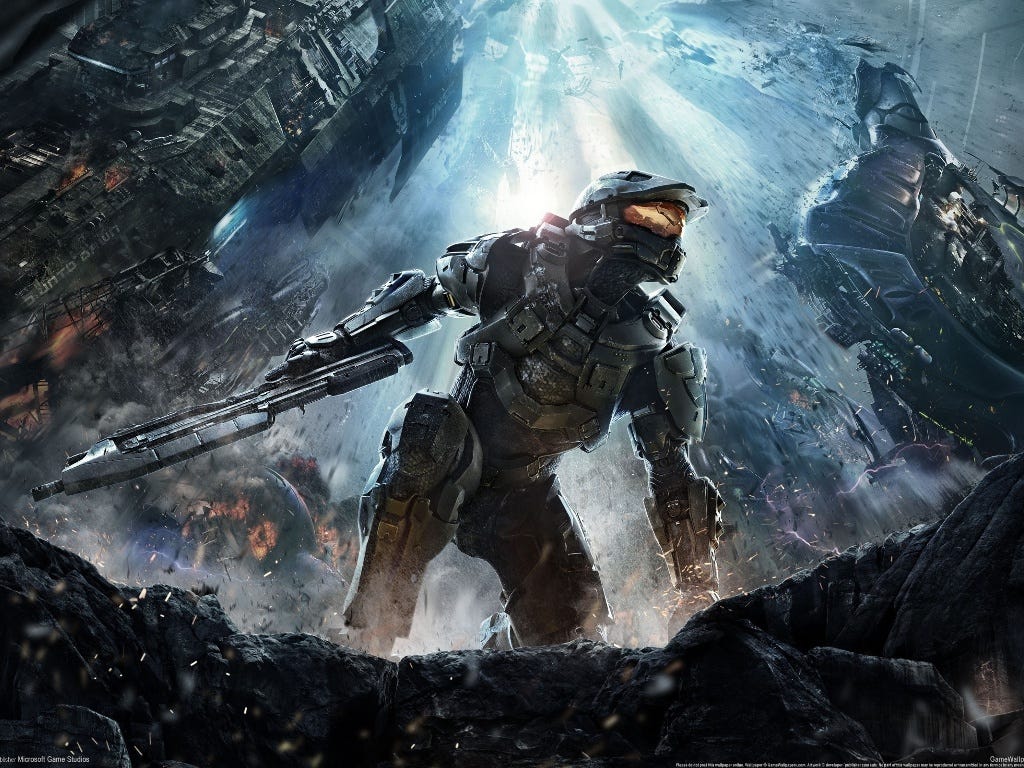
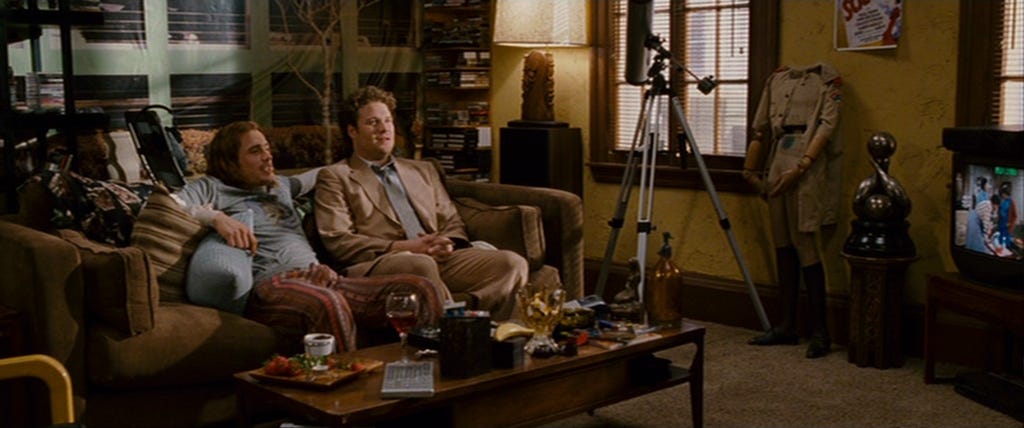


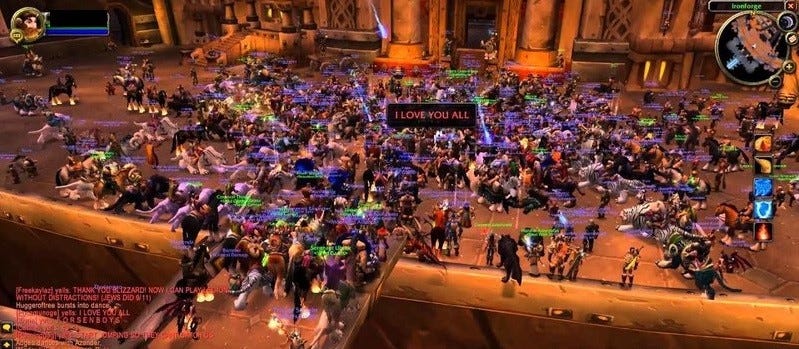


I can’t relate to the video games much.. I never played anything beyond SSX and Mario kart.. but there was one comment that stood out to me:
‘Only games allow for that kind of interactivity [to have an active part in the determination of the world], which forces you to wield your imagination.’
I think there are many people working in careers with the sole intention of developing creative solutions to complex global problems. Poverty, world hunger, climate change, water and energy crises, public health crises, etc. Many people spend their days actively wielding their imagination, in an effort to determine world outcomes – whether engineers, economists, policy makers, scientists, doctors… They are interacting with the world, visualizing what could be improved, and then repeatedly testing possible solutions until finding something that works. I think that all of the innovative technologies we’ve developed over the years – AI included – are incredible feats from humans flexing their imaginations. So I think that life can allow for that kind of interactivity - to take an active part in determining the world.
But I think the main difference between video games and real life is often scale of impact and levels of freedom (access/ability to make an impact). It sounds like in many of the video games, you have power over much of your environment – you can literally destroy or create entirely new worlds. Whereas in the real world, there are much more limitations, boundaries, rules, pre-established environments within which you have to operate. I could also see the possible constraints that would inhibit the level of interactivity in life compared to what you could access in a game. Especially for children and teens, who have limited freedom to get outside their home and explore new neighborhoods, new cities, new countries with all the new people, cultures and ‘worlds’ that that brings. So I could absolutely see the allure of getting to experience an entirely different world via video games – and maybe that’s why children are drawn to them most? Because it gives them both freedom and a feeling of meaning (making an impact on a world) that are largely restricted in their real lives?
This is so relatable to me, I did the exact thing with my brother, arguing about who gets to play WoW. I remember those sick days quite vividly too, except for me it was nacho chips and pear lemonade.
You wrote this so well, I loved this line especially: "But I wasn’t looking at the screen, I was looking through it."
I added The Tower to my reading list, you made me too curious about it.